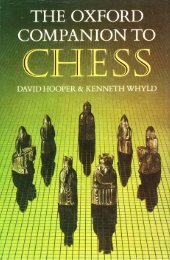You also want an ePaper? Increase the reach of your titles
YUMPU automatically turns print PDFs into web optimized ePapers that Google loves.
BARING CHESS 23<br />
%<br />
t i w<br />
%<br />
,9 b4 (wrrit's oUEEN's iDE uro{ta gtues hin a decisive<br />
adlanlage) 29 . . . Kg7 30 a.l e5 31 65 Rdl 32 Rc7 a6<br />
33 bxa6Rd4 34a7Rk4 l5 Kd3f5 36Kc3 Kf6 37Kb3<br />
R,l 13 Kh4 Kg5 39 Kb5 Kb5 40 Kb6 Bla.k resiens.<br />
BARCZA OPENINC, 691. White's first two moves<br />
nay be the prclude <strong>to</strong> a s,stem that is completed <strong>by</strong><br />
his playing 3 Bg2 and 4 0-0, delaying adion in lhe<br />
etrire until Black's inrendotu are knom. Trme<br />
pcilions <strong>to</strong> orher openings are possible: <strong>to</strong>r<br />
cx<strong>amp</strong>lo, White co d continue Pd3 and Pe2+,1, a<br />
reveftd KNc s rNDN. Innuenced <strong>by</strong> the SEER<br />
MoDERN movement, some playeA Lsed the Barcza<br />
Opening in the early 192ft, btrt it was k.own<br />
belore rheE. (see B Rcarnfn.)<br />
BiRczAY (pron. Bartsai). L.{szLO (r93G ).<br />
Ieading Hungaria. playe., I.lernational Grandmasrer<br />
(1967), Inte.natioMl Grandmdrer oI cor'<br />
respondene <strong>chess</strong> (1979), *inner at Polanica<br />
zdr6j 1969 and @-winner at D€ain 1978, both<br />
ionrnanenrs of about category 8. He played in one<br />
Olynpiad, Havana 1966, and nade an ex@llent<br />
BARDA, OLAF 0ql9-71), I.ternational Master<br />
(1952), Inte.natio.al correspondene <strong>chess</strong><br />
Grddmasrer (1953). In over'the board play-lE<br />
won the NoNegian Ch<strong>amp</strong>ionship six limes and<br />
played in a nlmber ofinternational lournamenis.<br />
trotably al Jdnkoping (Sweden) 1958 9, when he<br />
and rcrov tied lor tust prize and GGozrN was<br />
lhird. BardaNrotea<strong>chess</strong> ma.ual, iti4k[], in 1943.<br />
BARDELEBEN, CURT VON (1861-1924), Gef<br />
nan naster and wriler. After winni.g the mi,or<br />
rourndenl held concurently with fte master<br />
<strong>to</strong>urnanenr at lmdon 1883 he gave up senous<br />
<strong>chess</strong> <strong>to</strong> sludy law, vhich he nevcr pradised. 'He<br />
studiesche$andplarBallaw'saidacontemporary.<br />
Returning lo the gane a Iew years later he becane<br />
aregular lournaneorconpeti<strong>to</strong>r for the rest ofhis<br />
life. notably sharingthree fi6tprizes: Leipzig 1888<br />
( +4= 3) equal wirb xrEuNN i Kiel 1893 (+ 5:2 1)<br />
equal sith wALBRoDri and Coburg 1904, a rie *ith<br />
scHLEcm and swDERsKr. His temperamenr.<br />
however, was unsuited <strong>to</strong> long hard contesis and he<br />
otten nade indiflerent results. He pas a 6eful<br />
ma. in ches and in dres, bu! lor such a meticulous<br />
persa he had a surprisinA number ofwithdravats<br />
from roumaments and malches: al the grear<br />
Hastings <strong>to</strong>wnmen! of 1895 sErNrz won a<br />
brillia.y priu for his game against Bardelebe.<br />
who, alrh€ culninatiotr of his oppotrents coBN -<br />
ToN leil the roon and losl on lime ratner than<br />
resign. Up ro thal point he had scored si wins and<br />
three draq but this leveBal so up*i hiD thal o.ly<br />
vith diffrcdty w6 he pesuaded trot ro abandon tne<br />
compelidon. Soring only 4i points in the next<br />
elelen rounds, he shared scv€nth place wilh<br />
ETGMANN. Bardeleben vrore many books, nsually<br />
aboui openings, althotrgh his last work was a<br />
p<strong>amp</strong>bler on the hislory of the game. He sufiered<br />
hardship du.ina the dii6@lr years in Germany that<br />
fouowed lhe Firsi World War and @nditted<br />
Sreinit Brdeleben Hasti4s 1395 ftalian Operirg<br />
re4e5 2NBN.6 3Bc4Bc5 4dNf6 5d4eid4 6dd1<br />
Bb4+ 7Ndd5 3eid5Nxd5 9G0Be6 rotsxsBe7 11<br />
Bids Bxd5 12Nxd5 Qxd5 l3Bxe?N$7 14Rc1I6 15<br />
Qe2 Od7 16Rrc1.6 17 d5 cxd5 l3Nd4Kfl 19Ne6<br />
Rnd 20 o34 g6 21Ne5+ Ke3<br />
whire no{ besins a long coobim.ion duiiq *hich aI or<br />
ncr oI his pices remain.rplt..22 RxeT+ KfB 3 Ra/+<br />
Kg3 24 Rg7+ Kh8 25 kh7+ , and Black loi d tine.<br />
<strong>The</strong> gme nigir have .onrinucd 25 . . Kg3 26 Re?+<br />
Kh3 27 Oh4+ K{37 2aQh7+ Kn 29 Qh3+ Ke7 311<br />
og7+ Ke3 3r Os3+ Ke7 32 Qr7+ Kd3 33 O13+ Oe3<br />
34 Nl7+ (d7 35 Qd6 naie. Baideleb.n is .hjeny<br />
icncmbcicd lor .his lcr ganc.<br />
DARDEN, LEONARD WILLIAM, see NEws-<br />
BARE KING, a king without any other men of the<br />
sane colour on rhe board. In seTN, and in <strong>chess</strong><br />
of early medieval limes a game could be won <strong>by</strong><br />
lealing the oppo.ent with a bare king. <strong>The</strong><br />
dimcdry of mating *nh the old pieces may have<br />
made this win dcsirable. In sone countnes, e.g.<br />
Iceland, the bare ki.g was considered an inleiior<br />
<strong>The</strong> FIDE rules for live ninule <strong>chess</strong> state ihat a<br />
player having a bare ting only draws iI hG<br />
opPonent erceeds rhe time-limir.<br />
BARING CHESS, a gane in shich a player may<br />
win <strong>by</strong> leaving his opponent wnh a bare kingi a win<br />
bv checkmate is nol excluded




